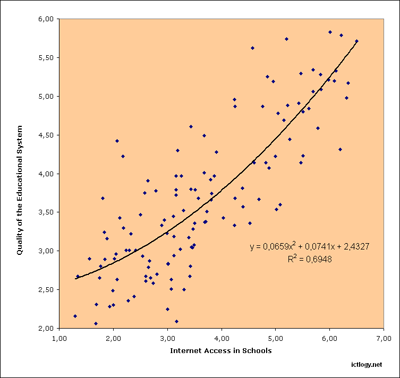The World Economic Forum’s Global Information Technology Report 2007-2008 is out. In my opinion, it does not bring any surprises, but reinforces some trends that we’ve been seeing lately:
- The increasing strength and importance of wireless technologies to get connected to the Network
- A gradual shift of the research focus from quantitative/economic impact analysis towards more qualitative/social impact analysis
- Hence, the realization that ICTs are much more than (information) productivity tools, and they have a role in socialization (through communication), mediated by digital literacy
Part of the Global Information Technology Report gets its data from the World Economic Forum’s Executive Opinion Survey, which, conducted annually, captures the perceptions of the leading business and investment decision-makers worldwide (many of whom represent the Forum’s member companies)
. As a qualitative survey, and based on perceptions
, all conclusions arising from it might be taken with tons of caution. Nevertheless, there are some findings that, even if taken with caution, are worth deserving a thoughtspan:
As the chart shows, there is a clear relationship between quality of an educational system (at the aggregate country level) and the existence of not computers but Internet access in schools. As said, while Internet access in schools is measured quantitatively after surveys sent to sample schools in every country, the Quality of the Educational System is a variable measured through a qualitative, subjective indicator after asking the 8,000 interviewees of the Executive Opinion Survey. In the survey, the respondents range the educational system from 0 to 7 whether the Educational system
.
[serves the] needs of competitive economy
Depending on how you agree with the definition of “quality” for a national educational system, and how you’d like the reality to fit your beliefs, different interpretations arise:
- The more straightforward: Internet access increases the quality of the educational system. The more Internet access, the better education.
- Inversely, we can say that high quality educational systems are more eager to introduce the Internet in schools than lower quality ones. The more quality of the system, the more (awareness in) the use of Internet.
- There’s a relationship between educational quality (as understood by the Executive Opinion Survey) and Internet access in schools, but we do not know which is the cause and which the consequence: they just happen to go hand in hand.
- Firms would be more likely to hire candidates with strong digital competences, as it looks like Internet and quality go together, and quality means a more competitive economy (i.e. firm).
- Stress would then be put in teaching digital skills in the design of educational strategies, along with the introduction of the Internet in the school
- If the Internet — this huge information silo — enters the classroom, the role of the educator should change, and shift from an information holder to a knowledge acquisition enabler or facilitator
- Open educational resources should be coming in and out of the classroom both as input and output
- This abundance of (educational) material would require more and better reputation systems and information assessment systems, all of them based in more and better digital skills
- And back to #1
Even if some of the previous statements are sweet music for cyberoptimists (like me), I wouldn’t strongly stand for any of it: there are too many loose ends to be axiomatic.
But one thing is absolutely clear: even if we cannot establish (yet) any causality between quality and educational Internet access, the perception is that some degree of relationship does exist. And if this perception is widely shared at both the decision-taker and policy-maker levels, some consequences in the short run would be likely to be expected:
In the most conservative scenario, I see this as the perception of inflation: regardless whether there is not the slightest chance for inflation to happen, if citizens believe so, there’ll be inflation. The sensation is now that digital skills matter and that we are going to evaluate education under this light. Schools must not just let themselves go along with the current (i.e. the cyberhype), but neither swimming against it.
If you need to cite this article in a formal way (i.e. for bibliographical purposes) I dare suggest:
Peña-López, I. (2008) “Internet Access in Schools and Quality of the Educational System” In ICTlogy,
#55, April 2008. Barcelona: ICTlogy.
Retrieved month dd, yyyy from
https://ictlogy.net/review/?p=701
Previous post: Seminar: The Personal Research Portal: The Virtual Faculty or the Net behind the Classroom
Next post: e-Readiness in post-conflict and developing countries: a reflection (part I)
 RSS feed for comments on this post.
TrackBack URI
RSS feed for comments on this post.
TrackBack URI


